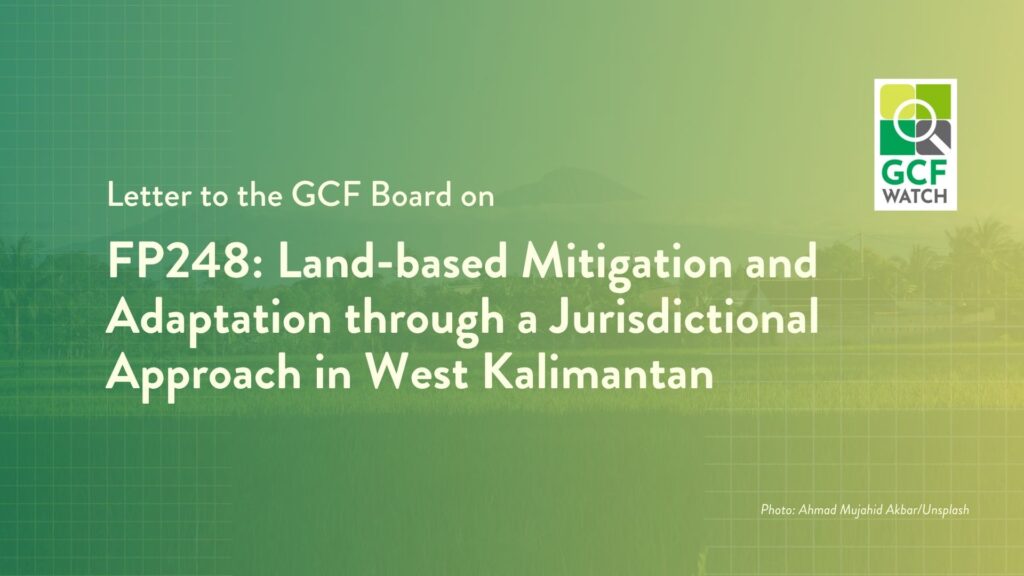STATEMENT: Pledging Conference for the Second Replenishment of the GCF
DOWNLOAD PDF
by the GCF observer network for civil society, Indigenous Peoples, and local communities
On October 5th in Bonn, countries came together to pledge funds as part of the second replenishment of the Green Climate Fund (GCF), and despite the event being hailed as a “success”, there are few ways that could be further from the truth. With a collective total of pledges below both the initial resource mobilization and first replenishment totals, developed countries are, on the whole, undervaluing the effort and resources needed to combat the climate crisis, and a massive mobilization of political will and drastic step-up in contributions is necessary.
At the close of the pledging conference, 25 countries had pledged 9.33 billion USD, with four additional countries indicating pledges would be forthcoming. The total pledged amount in the initial resource mobilization (IRM) in 2014 was 10.3 billion USD, from 49 contributors (countries, regions, and cities). Another 10 billion was pledged in 2019 for the first replenishment (including 9.7 billion USD at the pledging conference), by 32 contributors.
These numbers reveal that countries’ pledged and contributed amounts have stagnated from nearly a decade ago. While the total amount pledged is likely to increase over the coming months, it will not likely end up being significantly more than the initial 10.3 billion pledged in 2014. Despite climate impacts rapidly worsening, the warnings from the IPCC about the imperatives of urgent action to mitigate climate change, the global community continually fails to step up. Since the GCF’s initial resource mobilization in 2014, the world has experienced the eight hottest years on record. The number of devastating climate events has increased, leading to recurring physical and economic losses for the most vulnerable communities. Inflation has increased. What has not increased is the climate finance provided, especially through the GCF.
It has been estimated that by 2030, developing countries will need at least two trillion USD to reduce their greenhouse gas emissions, and almost 400 billion USD to build resilience and adapt to the worsening impacts of the climate crisis. The IPCC further highlights that we are quickly reaching a point where we will not have the ability to adapt given that the pace of action, and necessary finance, is too slow and inadequate. And this is to say nothing of what is needed for loss and damage, which only grows as we fail to mitigate with the necessary speed.
Earlier this year, the GCF observer network of civil society, Indigenous Peoples, and local communities called for an ambitious replenishment and reaffirmed their support for the GCF as a primary channel of climate finance. The GCF is the world’s largest multilateral climate fund and was built on the idea of operationalizing the principle of equity. While it was never meant to channel all the climate finance needed, nor even the 100 billion USD pledge that countries have failed to reach, the GCF is capable of channeling and should be capitalized with significantly more funds than it has been or that was pledged on October 5th.
Climate finance provided by those who have contributed the most to the climate crisis to those who have contributed the least and are facing the brunt of the impacts is critical for enhancing real action. The continued failure to provide substantive climate finance has not only had devastating impacts on the climate due to under-funding of the urgent action needed, but also damaging impacts on the trust necessary for the international cooperation needed to address this global problem. Real action is imperative as continued failure to act will only cause more climate chaos, which will also increase the cost to governments, communities, and people around the world.
Keeping these pledges at roughly the same level of funds as four years and nine years ago shows this pledging conference for what it is: a political game, rather than a pragmatic approach to the greatest challenge facing our planet and people. A failure to raise as much funding as pre-Paris is indicative of a failure to commit to the future the Paris Agreement envisioned: one in which multilateral efforts could limit warming to 1.5°C and increase countries’ climate resilience and ability to adapt.
This is even more egregious when you consider the funds that these same developed countries are contributing to ongoing support for fossil fuels.
The yardstick for ambition cannot only be what was pledged before, but what is fair and necessary for each country. Success is unlocking real political will and appreciating the depth of what is meant by a “fair share”, considering the historical emissions and capacity of developed countries to pay.
The good
We have observed some moments of leadership in this replenishment process.
- Denmark and Liechtenstein fully doubled their previous support.
- Ireland increased its support to the GCF by 150% over GCF-1.
- New Zealand increased its contribution over GCF-1 by 60%.
- Mongolia, which has received funding for numerous GCF projects, signaled its solidarity and commitment to the global effort by announcing a pledge.
The okay
Many other countries also increased their support over the previous replenishment period, but not only did not double their previous pledges, but failed to even increase by 50%:
- Germany stepped up with the biggest pledge overall, and a 33% increase over GCF-1.
- Canada increased its GCF-1 pledge by 50%, but unlike other countries, did not double between the initial resource mobilization and the first replenishment. Their previous pledges have also included loans.
- The UK and the Netherlands and many others also made various increases over their GCF-1 pledges in their local currencies, but they were relatively insubstantive.
The ugly
Still, other countries didn’t increase their contributions, with some even pledging less:
- Norway announced a pledge that is lower than their GCF-1 contribution.
- Japan announced a pledge at the same level as GCF-1, but given the changes in the relative value of the Yen, marked hundreds of millions of USD less in contribution.
- Portugal failed to pledge or indicate a forthcoming pledge, despite the new Executive Director of the GCF, Mafalda Duarte, hailing from Portugal.
The unacceptable
The elephant in the room is, of course, the U.S. Not only has the U.S. failed to make good on its initial pledge of 3 billion USD at the IRM as 1 billion is still owed, it has now failed to make a pledge at its second replenishment conference in a row. It is imperative that the U.S., the largest historical emitter, steps up and not only makes a pledge to the GCF, but also fulfills that pledge, and its previous one, with urgency.
What’s next
Notably, four countries came with commitments without specific numbers. While indicating a commitment to make a pledge is better than not showing up, the pledging conference has been long-planned and expected. These countries must step up between now and COP28 and announce the actual numbers and follow the “leadership” of other countries who have announced increases on their previous pledges:
- Sweden, previously a leader in the relative ambition of its pledge, must contribute to the GCF once again to indicate its ongoing commitment to addressing the climate crisis.
- Switzerland and Italy should follow the leadership of Denmark and at least double their pledges from GCF-1.
- Australia, which we fully support coming back into the fold as it announced its intention to rejoin as a GCF contributor, must increase its contribution. Australia said it would make a “modest” contribution, but considering the relative insignificance of its first pledge during the IRM, modesty could still encompass quite a range of increase.
Climate leadership is not judged on rhetoric, but on action. Countries cannot claim to be climate leaders and committed to keeping 1.5°C alive while also failing to provide scaled up funds to the GCF. The pledging conference is a testament to the lack of leadership from developed countries, and their promises are meaningless if they are not matched by concrete action. Doing their “fair share” should be the only option. Their delays and denial of obligation and responsibility deepen the impacts on people and communities and increase the already colossal magnitude of climate injustice.
The climate crisis and all those feeling its effects demand more. The replenishment of our largest climate fund must be responsive to the worsening impacts of the crisis, instead of continuing business-as-usual. This absurd mismatch between the increase in urgency and the plateauing of pledges signals that developed country decision-makers are not experiencing, or concerned about experiencing, the reality of climate catastrophe.
COP28 can and should be a moment for enhanced climate ambition and that demands enhanced climate finance. We are losing time in this critical decade for urgent action. Any hopes for achieving the goals of the Paris Agreement and tackling the climate crisis means there can be no more excuses and no more delays. Real finance is needed and it is needed now.
###








